News from Maison de la Gare
Conversations with the Talibés
TweeterLest we forget – Kiran Kreer’s amazing photographs and interviews remind us all that we can never let up on our efforts to give these children a chance at life
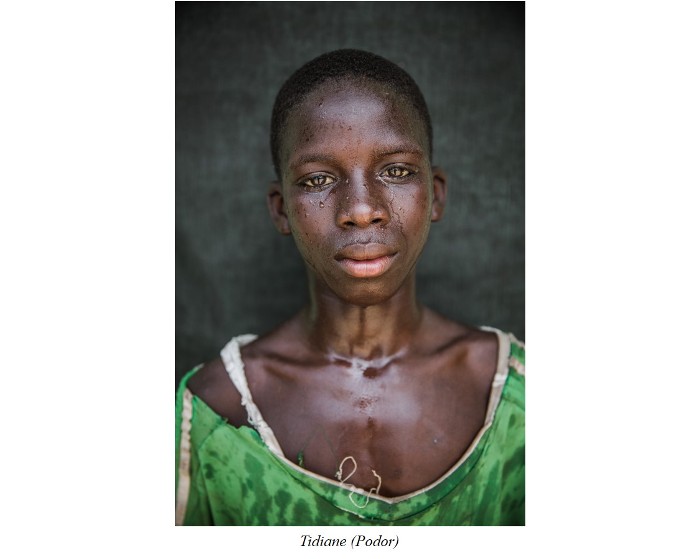
“How long have you lived in the daara? I can't remember, maybe four years.”
Tidiane, now 12 years old, is from a desert region in the north of Senegal. He hasn't seen
his family for many years and lives in a daara with many others and sleeps on a concrete floor. He is a talibé.
“How much do you get when you go out to beg? About 300 francs a day." (about US$0.50 or 0.50 euros)
“What do you do with the money? I give it to my marabout, for shelter and food. You are asked to beg
every day? Yes. You are here to learn the Quran? Yes, I am still in the early stages, the Surah.”
“How much longer do you have? Many more years. I don't know. Before I can go home. Will you see your
family? No, I only call them at times. Do you miss them? Yes, I miss my father.”
That is water on Tidiane in the photo, not tears. He had been playing football with the other boys, in sand,
and had washed himself. I loved the way he looked, as a reflection of the duality of his life.
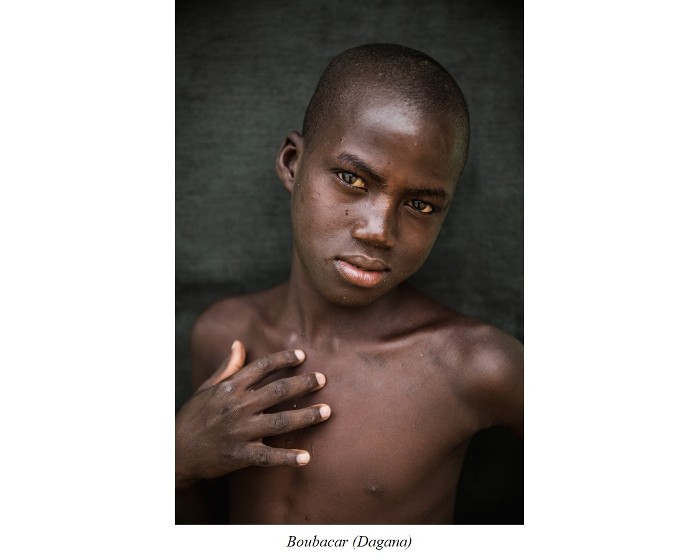
“How did you get that injury on your back? I was doing some work to build
my daara, and a boy hit me with a brick.”
Boubacar is 12 years old now and has been living in a daara for seven years. He is still learning
the Quran. He is also a talibé from the north of Senegal.
“Why aren't you in school? I don't know. Do you go begging every day? Yes, for rice or money.
I must bring back at least 300 francs every day for my marabout. And now you are doing construction work?
Yes, we are renovating the daara. I work with bricks and masonry. How long have you done that? I don't
know. We always build sometime or work. It's not finished yet. How many boys in your daara now? About
50 boys. You don't want to go back home, to see your parents? No. I don't know.”
The more I spoke to him, the more I kept feeling how conditioned he is, like a slave for all these years,
uncertain of his future or what real life is as a young boy.
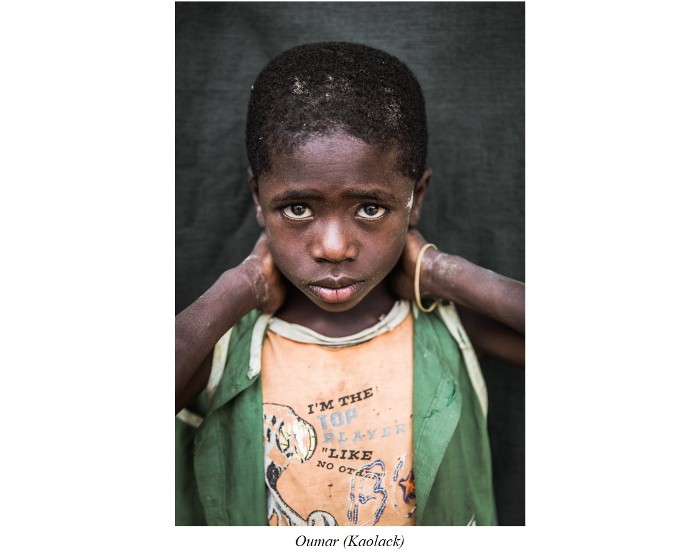
"If you have a choice to go back home or stay at your daara, what would you do?
I would like to go home. Why? Because I get hit with a cane.”
Oumar, who doesn't know his own age, comes from the area of Kaolack in the south of
Senegal, close to Gambia. He has been in the daara for three years now, brought here by
a marabout to study the Quran.
“Why do you get caned? If I don't bring back enough money or rice. You must go begging every day?
Yes. Sometimes I work at the fish market.”
“How did you get here? A marabout came to my village, spoke to my parents and brought me here with some
other boys. When is the last time you saw your parents? I don't know. I can't remember. When will
you see your parents again? I don't know; I hope the next Eid festival. Do you like it at your daara?
No. Because the marabout canes me.”
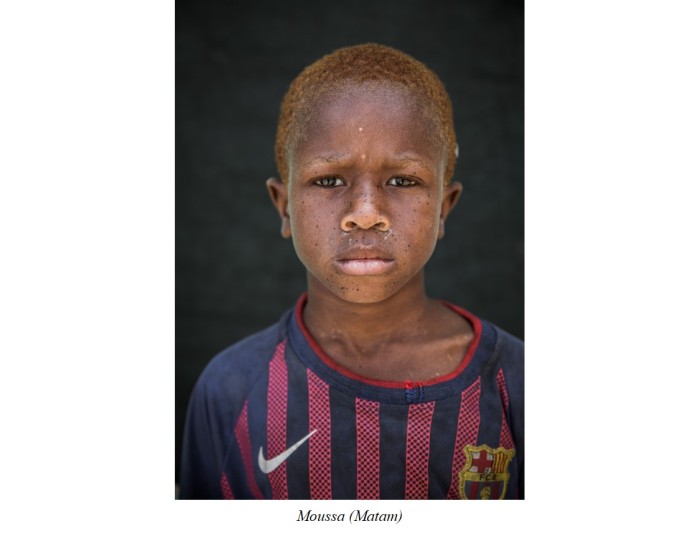
I asked him how old he is. He looked down and said, "I don't know."
Moussa is another talibé from the north along the border of Senegal with Mauritania. He
loves playing football and his favourite player is Messi. Moussa has been living in his daara in Saint
Louis for a few years, studying the Quran.
“How long have you been here? I don't know how long. A few years. Do you go begging every day?
Yes, every day. How much do you usually collect? Sometimes 200 francs. What do you do with the
money? I give it to my marabout.”
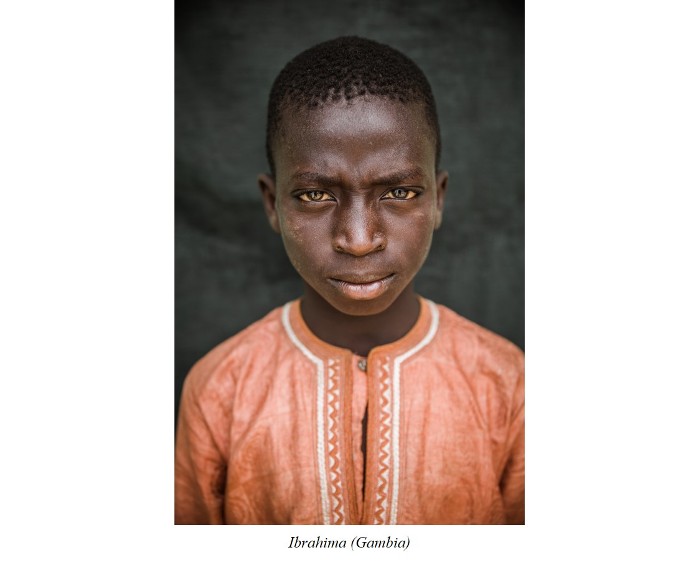
"My marabout hits me with a wooden stick if I don't bring back enough money for the day."
Ibrahima doesn’t know his age. He is from a rural village in Gambia. Ibrahima has two older sisters back
home and was brought here by a marabout with his other brother to study the Quran in a daara.
He too is a talibé.
"I sometimes work at the fish market, helping the women there carrying heavy baskets. They give me a little
money for that. Do you have to go begging every day? Yes. For rice and money. I need to bring back 200
francs for my marabout. What if you don't get the 200 francs for the day? Then he hits me. I have to
clean the daara too.”
"When did you come here? I'm not sure any more, when I was little. How old are you now? I don't know.
Would you like to go back home to Gambia? Yes, but my marabout doesn't allow it."
He then stops speaking about it, putting his head down and wanting to go. I could see the fear and
conditioning in his gestures.
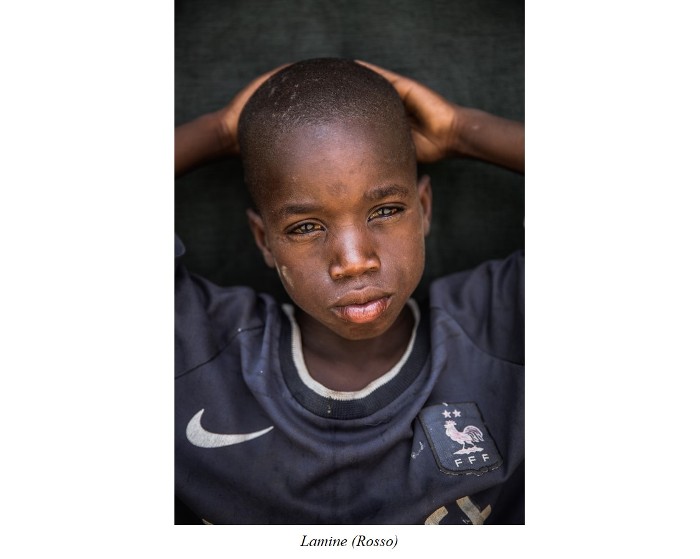
Lamine puts out his hand showing me how tall he was when he first started begging on the streets. I
noticed him at Maison de la Gare’s center, playing in the sand with the other boys, constantly rubbing his eyes
and scratching himself.
"Do you have an eye infection? I don't know. Does it hurt? Yes. How did you get it? I'm not sure."
"So what time do you usually wake up? Around six in the morning. Then what do you do for the day? We study
the Quran, then we go out to the local bus station to beg for food and money. I come back around 3 p.m.; we must
come back to the daara. To study the Quran? Yes. When do you shower, or brush your teeth, or how about going
to the bathroom? We just go to the river here; we go out around 6 p.m. We must go out to look for food and money."
"Where do you go at night? Around here; we go begging house to house. And that’s why you carry the plastic
bucket? Yes, we usually get some rice, or sometimes fish. And how much money do you usually get? Sometimes
100 francs, sometime close to 200 francs. What happens when you don't get enough? My marabout will hit me."
"What time do you go to bed? Around 10 p.m., after night lessons. So you have been doing this every day all these
years? Yeah. How did you get your leg injury? I was running and I fell while crossing the street. Where
are your shoes? I don't have any."
__________
We are grateful to Kiran Kreer for this report of his photo encounters with talibé children in Saint Louis. Kiran
has embarked on a “Voyage of Light” in Africa. Voyage of Light is a grassroots movement that supports rural
communities living with no access to electricity and basic human needs, with self sustainable solutions,
empowering youth and educating children. We invite you to follow his journey at this link.
Kiran has collaborated with Maison de la Gare on this photo series to help create awareness and to highlight the
exploitation, trafficking and abuse of the talibé children. He explains that a talibé - meaning disciple or student
- is a boy, usually from rural Senegal, the Gambia, Guinea, Guinea-Bissau, Mali or Mauritania, who studies the Quran
and Islamic values at a daara. This education is guided by a teacher known as a marabout. In most cases talibés
leave their parents to stay in the daara. Part of the teachings is to beg for food and money. Today this has evolved
into exploitation and abuse of these boys. Many talibés live in less than humane conditions, sleeping on concrete
floors, begging daily and separated from their families.
Both the names of the talibé children and of the regions they come from in Senegal have been
changed in this report.

